- Home
- Edith Wharton
That Good May Come Page 3
That Good May Come Read online
Page 3
As he mused thus his unquiet eyes again began to wander; and suddenly they fell upon a lady who sat near by with a little girl in white muslin at her side. The lady's face was very familiar to him, though he had never before seen it composed into its present expression of devotional repose. It was a pretty face, crowned by abrupt waves of reddish hair just dashed here and there with a streak of gray, and lit by an insinuating, agate-colored glance; but the sight of it burned Maurice's eyeballs like vitriol, for it was the face of Mrs. Tolquitt.
He had never seen her thus before, with sober lips and modestly meditative lids; nor had he ever seen the small, solemn replica of herself now seated beside her in billows of clear white muslin. The sight was an intolerable rebuke, and he would have given the world to hear her familiar laugh rattle derisively through the high quietude of the aisles. As he gazed she turned her head, fixing upon him an absent look which gradually melted into a subdued smile of recognition. Then she made a slight sideward motion of her eyes, which plainly said, "This is my little girl."
Maurice noticed that she showed no surprise at seeing him there; she seemed to consider his presence as much a matter of course as her own, and with a shudder he said to himself, "Good heavens, perhaps she thinks I have come to see her daughter confirmed!"
The service rolled on, with its bursts of music and interludes of prayer, its mystical moving of brilliant figures and flitting of lights about the altar; and at length Maurice was aware of a pause, followed by a stirring of the white dovecote in whose midst he sat. He saw Mrs. Birkton glance tearfully at Annette. The girl's lips and eyelids were trembling, and for a moment she seemed unable to move. At length she looked up, fixing her eyes on the golden crucifix above the altar; then, as if hypnotized by the sight, she rose and glided into the aisle, mingling with the fluctuant mass of white-veiled figures which had begun to move slowly toward the apse.
Presently they were all kneeling together on the chancel step, settling their dresses with the quick motions of a flock of birds; and above them, whitely hovering, Maurice saw the pontifical head and voluminous sleeves of the bishop. Annette knelt so that he could just see her between the intervening piers; but Mrs. Tolquitt's daughter was hidden from him, lost in the impersonal array of white veils and bowed heads.
The organ murmured a soft accompaniment above which rose the monotonous cadence of the episcopal supplication, "Defend, O Lord, this thy child. . . . Defend, O Lord, this thy child . . ." reiterated like an incantation, as the invoking hands passed slowly down the line of motionless young heads.
Maurice saw the hands sway above Annette's pale braids, which shone like winter sunshine through her veil; then they moved on, and his eyes turned involuntarily to Mrs. Tolquitt. But she did not see him now; she was crying, not daintily, for the gallery, but in genuine self-surrender, her shoulders shaking, her handkerchief pressed against her face.
There came over Maurice an uncontrollable longing to escape; the smoke of the incense and the strong fragrance of the lilies sickened him, and Mrs. Tolquitt's sobs seemed to be choking in his own throat.
At length the white line about the chancel swayed, broke, and dissolved itself; the choir burst into another victorious hymn, and the little veiled figures came fluttering back to their seats. In the ensuing disturbance, Maurice rose with a quick whisper to his mother--"Let me pass--I'm going out. I can't stand the incense"-- and while Mrs. Birkton made way for him, startled and disappointed, his glance fell for a moment on Annette's illuminated face, as she moved toward her seat with fixed eyes and folded hands. Her whole gaze was bent upon the inner vision; she did not even see him as he brushed her dress in passing out.
It was like a new birth to get out into the snow again, and Maurice, after a sharp breath or two, stepped forth rapidly against the wind, courting the tingle of the barbed flakes upon his face.
He did not go home until late that evening, and when he entered the kitchen, he was met by the festal spectacle of the supper-table adorned with a cluster of white lilies and a delicate array of fruit and angel-cake. Annette, in her habitual dress of dark stuff, looked more familiar and less supernal than before, and though her face still shone, it now seemed to Maurice that he could discern the mingling of a gratified childish vanity with the mystical emotions of the morning.
"I'm so glad you have come, dear," Mrs. Birkton exclaimed, her countenance still dewy with a pleasant agitation. "Annette, is the chicken ready? We have a broiled chicken for you, Maurice, dear, and a little mayonnaise of tomatoes."
As she spoke her eye turned toward the supper-table, dumbly challenging his praise.
"How nice it looks," he murmured, obediently.
"It is all owing to you, dear," his mother replied. "We asked Mr. Helfenridge to come to supper, too; we thought you would like to have him."
"Is he coming?" Maurice asked, abruptly.
"No, he couldn't unfortunately. He said he had promised to go to his sister's."
They sat down, Annette mutely radiant at the head of the table, with her mother and Maurice at the sides; but to the dismay of the two women Maurice refused to partake of the delicacies which they had prepared. He had a headache, he said; but he sat watching them eat, in spite of his mother's entreaties that he should go and lie down in his own room.
When supper was over, however, he rose and bade them good- night; Annette's kiss was mingled with an inarticulate whisper of gratitude, but he pushed her gently aside, and the women heard him cross the passage-way and shut himself into his own room.
In a few moments, however, he was aroused by a timorous knock, which he recognized as his mother's.
"Come in," he called, and Mrs. Birkton stepped apologetically across the threshold.
"Maurice, is your head very bad?"
"No, no--it's not bad at all. I only want to be quiet."
"I know, dear, and I'm very sorry to disturb you. But here is the rest of this money--I can't keep it, you know, Maurice. Annette's dress and shoes and veil, and the carriage and supper, and the new strings for my bonnet, only cost twenty-seven dollars and a half, and I can't possibly keep the rest unless you will let me use it for the household expenses, as usual."
Maurice sprang up, white to the lips.
"For God's sake, mother, understand me. I don't want the money--I won't touch it. I can provide plenty for the household; I haven't let you starve yet. And this is Annette's; yours and hers. If you won't spend it for yourself let Annette put it in the savings-bank; or let her throw it into the street; I don't care what becomes of it--but don't speak to me of it again. I'm sick to death of hearing about it!"
Mrs. Birkton shrank back, trembling at his unwonted tone. She was afraid that he was going to be really ill, and her one thought was to withdraw without increasing his agitation.
"Very well, dear--just as you please," she said, deprecatingly. "It was foolish of me to trouble you. Don't think of it again, but go to bed and try to sleep. I ought not to have disturbed you."
And she slipped back into the passage-way, stealthily closing the door.
Maurice had no thought of going to bed. He sank into his arm- chair, which he had pushed close to the gas-stove, and sat staring at the hard yellow brilliance of the polished radiator.
Helfenridge had gone to see Annette confirmed, but he had not been willing to come to supper; and Maurice knew him too well not to penetrate the shallow excuse which had satisfied Mrs. Birkton. Well, Helfenridge was right; no man can handle pitch without being defiled. And once a man's hand is soiled, why should his friends care to touch it?
After all, no cheap condonation of Helfenridge's would have helped Maurice now; rather did he feel a tonic force in his friend's disapproval. It showed Helfenridge to be the better and stronger man; and there was a kind of dispassionate consolation in that. If one had to fail it was better that the other should hold fast than be dragged down with him; and Helfenridge had always been the firmer-footed of the two.
So Maurice mused, letting the desol
ate hours travel on unregarded; till suddenly his vigil was disturbed by a knock, sharp and resolute this time, which made him start to his feet.
"Helfenridge!" he exclaimed, and there on the threshold stood his friend.
Maurice, on seeing him enter, had felt an involuntary thrill of relief, as though he were regaining his moral footing, but the illusion was transient and left him to sink back into profounder depths of self-accusal.
"I thought you weren't coming. You would have been quite right not to come," he said, without asking his friend to sit down.
"I didn't mean to come," Helfenridge answered, taking off his coat. "Your mother asked me to supper, but I refused. I couldn't see my way clear at first--even in church that little white seraph didn't seem to justify it for a moment; but I have been thinking hard all day--and now I've come."
He held out his hand, but Maurice made no motion to take it.
"It's no use," he said, heavily. "No amount of thinking will make it right. What's that in the Bible about doing evil that good may come? That's what I've done. I've done evil that good might come--but it hasn't come--it can't. The fellow in the Bible was right. You think Annette's dress was white? I tell you it was black--black as pitch."
"No, no," said Helfenridge, taking the chair which Maurice had not offered him. "The whole business is horribly mixed up, like most human affairs, but there's a germ of right in it somewhere, and the best thing we can do now is to nurse that and get it to flower."
"To flower?--bah--a poison-ivy--"
"Some poisons are valuable medicines," said Helfenridge.
"Oh, stop--drop that inane metaphor. I tell you there's no excuse for what I did; and what's worse there's no reparation. I'd give myself up, I'd go and proclaim the whole thing--but what good would that do? Smother everybody in mud--Annette, and my mother, and that poor woman! Helfenridge--"
"Well?"
"That woman--Mrs. Tolquitt--was in church with her little girl, who was confirmed. Think of it, will you! Her little girl was confirmed with Annette! And they sat next to us--only a few seats off. Helfenridge, I never knew she had a little girl."
"I don't suppose we any of us know much about anybody else," said Helfenridge.
"And there she sat crying--crying, I tell you. Just such tears as my mother's--glad and proud and sorry all at once!"
"Yes, I saw her."
"You saw her--and you're here now?"
"I'm here, Maurice, because I know what you're suffering."
They were both silent, Helfenridge seated with bowed head, Birkton stirring uneasily about the room with the thwarted movements of a caged animal.
At length he flung himself down in the chair in front of his desk and hid his face against his arms. Helfenridge heard his sobs.
It seemed a long time before either of them spoke; but finally Helfenridge rose and touched his friend's shoulder.
"My eyes are clearer than yours just now," he said, "and I shouldn't be here if I didn't see a way out of it."
"A way out of it?"
"Yes, only it's no empirical remedy: geschehen ist geschehen. But you spoke just now of the biblical axiom that good can't come out of evil; well, no generalization of that sort is final. It seems to me, on the contrary, that this good can come out of evil; that having done evil once it may become impossible to do it again. One ill act may become the strongest rampart one can build against further ill-doing. It divides things, it classifies them. It may be the means of lifting one forever out of the region of quibbles and compromises and moral subtleties, in which we who are curious in emotions are apt to loiter till we get a shaking up of some sort. It's horrible to make a stepping-stone out of a poor woman's anguish and humiliation; but the anguish and humiliation can't be prevented now; and who knows? in the occult economy of things they may be of some use to her if they help somebody else."
Maurice flung off his hand with a passionate gesture. "Quibbles and compromises and moral subtleties! What else is your reasoning made up of, I should like to know? It's nothing but the basest Liguorianism. The plain fact is that I'm a damned blackguard, not fit to look decent people in the face again."
His head sank once more upon his outstretched arms, and Helfenridge drew back.
"Shall I go then, Maurice?"
"Yes, go; it's worse when you're here."
Helfenridge for a few moments stood irresolute, as if waiting for his friend to recall him; but Maurice still sat without moving, bowed beneath the immensity of his shame.
"Well, I'm going," Helfenridge reluctantly declared.
Maurice made no reply; his shoulders still shook, although his grief had grown noiseless.
"Remember, Maurice," his friend conjured him, "that whatever you do your mother and sister mustn't find out about this business. That's your first duty now, to hide the whole thing from them."
Still there came no answer. Helfenridge turned to the door and slowly opened it, glancing back as he did so at Maurice's downcast head; then he stepped out into the passage-way. But as the door closed behind him a new impulse, uncontrollable in its suddenness, made him turn back abruptly and re-enter the room.
"Look here, Maurice, listen to me," he exclaimed. "I didn't mean to tell you--but, hang it all, there's no use in your taking it like this. Blason was waiting for Mrs. Tolquitt outside the church, and I saw them drive away together in her brougham, with the little girl between them."

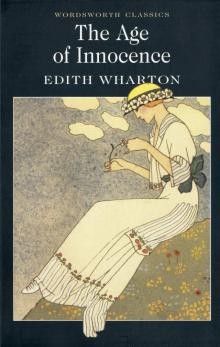 The Age of Innocence
The Age of Innocence The Reef
The Reef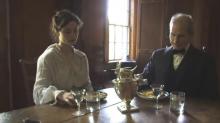 Summer
Summer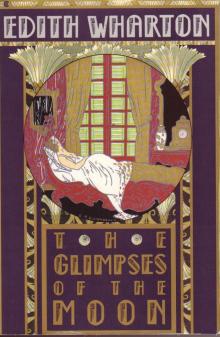 The Glimpses of the Moon
The Glimpses of the Moon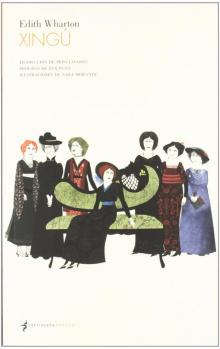 Xingu
Xingu The Fruit of the Tree
The Fruit of the Tree Fast and Loose
Fast and Loose Artemis to Actaeon and Other Verse
Artemis to Actaeon and Other Verse The Line of Least Resistance
The Line of Least Resistance The Lamp of Psyche
The Lamp of Psyche The Reckoning
The Reckoning Afterward
Afterward The New York Stories of Edith Wharton
The New York Stories of Edith Wharton The 2014 Halloween Horrors Megapack
The 2014 Halloween Horrors Megapack 'Copy': A Dialogue
'Copy': A Dialogue The Recovery
The Recovery The Fulness of Life
The Fulness of Life Early Short Stories Vol. 1
Early Short Stories Vol. 1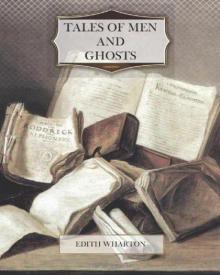 Tales of Men and Ghosts
Tales of Men and Ghosts The House of the Dead Hand
The House of the Dead Hand That Good May Come
That Good May Come The Buccaneers
The Buccaneers Other Times, Other Manners
Other Times, Other Manners The Hermit and the Wild Woman
The Hermit and the Wild Woman Kerfol
Kerfol The Duchess at Prayer
The Duchess at Prayer Bunner Sisters
Bunner Sisters The Choice
The Choice Madame De Treymes
Madame De Treymes Ethan Frome, Summer, Bunner Sisters
Ethan Frome, Summer, Bunner Sisters In Morocco
In Morocco The Valley of Decision
The Valley of Decision Age of Innocence (Barnes & Noble Classics Series)
Age of Innocence (Barnes & Noble Classics Series) The Angel at the Grave
The Angel at the Grave April Showers
April Showers Sanctuary
Sanctuary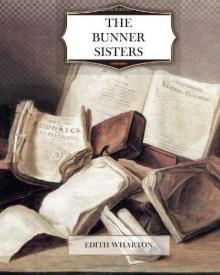 The Bunner Sisters
The Bunner Sisters Mrs. Manstey's View
Mrs. Manstey's View Writing a War Story
Writing a War Story The Custom of the Country
The Custom of the Country In Trust
In Trust The Triumph of the Night
The Triumph of the Night The Hermit and the Wild Woman, and Other Stories
The Hermit and the Wild Woman, and Other Stories Roman Fever and Other Stories
Roman Fever and Other Stories The Mission of Jane
The Mission of Jane The Descent of Man and Other Stories
The Descent of Man and Other Stories Coming Home
Coming Home The Touchstone
The Touchstone Early Short Stories Vol. 2
Early Short Stories Vol. 2 Edith Wharton's Verse, 1879-1919, from various journals.
Edith Wharton's Verse, 1879-1919, from various journals.